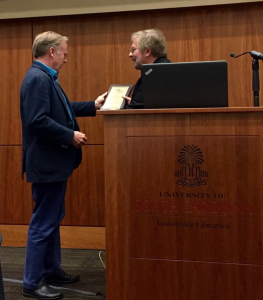At the closing dinner of the Fourth Biennial John Updike Society Conference, the society honored The Robert and Adele Schiff Family Foundation with its Distinguished Service Award.
 The award is small, a token but heartfelt appreciation; the service is huge. The Robert and Adele Schiff Family Foundation gave the society the money to purchase The John Updike Childhood Home at 117 Philadelphia Ave. in Shillington, Pa., where Updike said his “artistic eggs were hatched.” Since then, foundation donations have enabled the society to hire a historic restoration specialist and to restore the interior and exterior of the house to pre-1945, when young Updike famously saw it recede as he looked out of the car window en route to the family’s new home at the Plowville farm—a move that took him away from classmates and the house he loved. Because of the tremendous generosity and support of The Robert and Adele Schiff Family Foundation, significant changes have been made to return the house to the way it once was. Updike’s bedroom has been reconfigured to its original size, with “The Black Room” (which he talks about in the short story by that name) next to it. The upstairs hallway now extends all the way to the front of the house, as it did during Updike’s time, and the living room and parlor are separated by columnar dividers, as they were when young Updike lived in the house. And the Victorian spindlework whose removal he mourned has been reinstated.
The award is small, a token but heartfelt appreciation; the service is huge. The Robert and Adele Schiff Family Foundation gave the society the money to purchase The John Updike Childhood Home at 117 Philadelphia Ave. in Shillington, Pa., where Updike said his “artistic eggs were hatched.” Since then, foundation donations have enabled the society to hire a historic restoration specialist and to restore the interior and exterior of the house to pre-1945, when young Updike famously saw it recede as he looked out of the car window en route to the family’s new home at the Plowville farm—a move that took him away from classmates and the house he loved. Because of the tremendous generosity and support of The Robert and Adele Schiff Family Foundation, significant changes have been made to return the house to the way it once was. Updike’s bedroom has been reconfigured to its original size, with “The Black Room” (which he talks about in the short story by that name) next to it. The upstairs hallway now extends all the way to the front of the house, as it did during Updike’s time, and the living room and parlor are separated by columnar dividers, as they were when young Updike lived in the house. And the Victorian spindlework whose removal he mourned has been reinstated.
The John Updike Childhood Home is an important literary site and museum-in-progress that will become every bit as much of a part of America’s cultural history as the Mark Twain homes in Missouri, New York, and Connecticut, the Fitzgerald home in Alabama, and the Hemingway homes in Florida, Illinois, and Idaho. The society is grateful to The Robert and Adele Schiff Family Foundation for playing such a large part in establishing this cultural monument. Pictured is society vice-president James Schiff, accepting the award on behalf of his family foundation from society president James Plath. Also receiving plaques at the dinner were Thomas F. McNally and Elizabeth Sudduth, in gratitude for going above and beyond the call of duty in hosting the conference, and Don Greiner, for serving as director.
